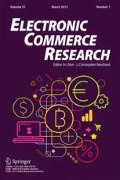Abstract
Numerous services issued from the emergence of web technologies drive research on how to provide users with trusted and credible services aligned with their needs. To tackle the service targeting problem, recommender systems have been developed. They are grouped into content-based approaches and collaborative filtering based approaches. Strongly focused on the target user profile, content-based methods are inaccurate when the target user profile is poor. To remedy this, collaborative filtering based methods exploit past experiences from many users. In the literature, they are organized into rating methods and ranking methods. In this paper, we propose a trusted collaborative filtering based approach that combines assets of both rating and ranking methods. Our proposal is built on an enhanced hybrid similarity measure and a novel trustworthiness score that is thereafter used to select trusted and relevant user profiles involved in the prediction process. By employing a customized ranking measure, our method improves the service ranking precision without affecting the rating prediction accuracy. Experiments are conducted on the WS-Dream dataset containing 339 users and real-world Quality of Service values related to 5825 web services. Compared to state-of-the-art collaborative filtering based methods, the obtained results show that our proposal offers the best trade-off in terms of rating prediction accuracy and ranking prediction accuracy.










Similar content being viewed by others
Data availability
The test data and training data used to support the findings of this study have been gathered from WS-DREAM website (http://wsdream.github.io/).
References
Zheng, Z., Wu, X., Zhang, Y., Lyu, M. R., & Wang, J. (2013). QoS ranking prediction for cloud services. IEEE Transactions on Parallel and Distributed Systems, 24(6), 1213–1222. https://doi.org/10.1109/TPDS.2012.285.
Yang, Z., Wu, B., Zheng, K., Wang, X., & Lei, L. (2016). A survey of collaborative filtering-based recommender systems for mobile internet applications. IEEE Access, 4, 3273–3287. https://doi.org/10.1109/ACCESS.2016.2573314.
Ahmadian, S., Meghdadi, M., & Afsharchi, M. (2018). Incorporating reliable virtual ratings into social recommendation systems. Applied Intelligence, 48(11), 4448–4469.
Zheng, X., Xu, L. D., & Chai, S. (2017). QoS recommendation in cloud services. IEEE Access, 5, 5171–5177. https://doi.org/10.1109/ACCESS.2017.2695657.
Liu, Y., & Yang, J. (2015). Improving ranking-based recommendation by social information and negative similarity. In 3rd international conference on information technology and quantitative management, ITQM 2015 (Vol. 55, pp. 732–740). https://doi.org/10.1016/j.procs.2015.07.164.
Jayapriya, K., Ani Brown Mary, N., & Rajesh, R. (2015). Cloud service recommendation based on a correlated QoS ranking prediction, vol 24. https://doi.org/10.1007/s10922-015-9357-5.
Tian, H., & Peifeng, L. (2017). Personalized service recommendation based on trust relationship 2017. https://doi.org/10.1155/2017/4106134.
Martinez-Pabon, F., Ospina, J., Ramirez-Gonzalez, G., & Organero, M. (2016). Recommending ads from trustworthy relationships in pervasive environments, vol 2016. https://doi.org/10.1155/2016/8593173.
Deng, S. G., Huang, L. T., Wu, J., & Wu, Z. H. (2014). Trust-based personalized service recommendation: A network perspective. Journal of Computer Science and Technology, 29(1), 69–80. https://doi.org/10.1007/s11390-014-1412-2.
Chen, X., Guo, Y., Yang, Y., & Mi, Z. (2016). Trust-based collaborative filtering algorithm in social network. In 2016 international conference on computer, information and telecommunication systems (CITS) (pp. 1–5). https://doi.org/10.1109/CITS.2016.7546412.
Parvin, H., Moradi, P., & Esmaeili, S. (2019). TCFACO: Trust-aware collaborative filtering method based on ant colony optimization. Expert Systems with Applications, 118, 152–168. https://doi.org/10.1016/j.eswa.2018.09.045.
Eirinaki, M., Louta, M. D., & Varlamis, I. (2014). A trust-aware system for personalized user recommendations in social networks. IEEE Transactions on Systems, Man, and Cybernetics: Systems, 44(4), 409–421. https://doi.org/10.1109/TSMC.2013.2263128.
Kluver, D., Ekstrand, M. D., & Konstan, J. A. (2018). Rating-based collaborative filtering: Algorithms and evaluation. In P. Brusilovsky & D. He (Eds.), Social information access: Systems and technologies (pp. 344–390). Cham: Springer International Publishing. https://doi.org/10.1007/978-3-319-90092-6_10.
Farooque, U. (2016). Implementing user based collaborative filtering to build a generic product recommender using Apache mahout. In 2016 3rd international conference on computing for sustainable global development (INDIACom) (pp. 984–987).
Jia, Z., Yang, Y., Gao, W., & Chen, X. (2015). User-based collaborative filtering for tourist attraction recommendations. In 2015 IEEE international conference on computational intelligence & communication technology (pp. 22–25). https://doi.org/10.1109/CICT.2015.20.
Gong, S., & Ye, H. (2009). Joining user clustering and item based collaborative filtering in personalized recommendation services. In 2009 international conference on industrial and information systems (pp. 149–151). https://doi.org/10.1109/IIS.2009.70.
Su, X., & Khoshgoftaar, T. M. (2009). A survey of collaborative filtering techniques 2009. https://doi.org/10.1155/2009/421425.
Zhang, H., Ganchev, I., Nikolov, N. S., & O’Droma, M. (2016). A trust-enriched approach for item-based collaborative filtering recommendations. In 2016 IEEE 12th international conference on intelligent computer communication and processing (ICCP) (pp. 65–68). https://doi.org/10.1109/ICCP.2016.7737124.
Zheng, Z., Ma, H., Lyu, M. R., & King, I. (2011). QoS-aware web service recommendation by collaborative filtering. IEEE Transactions on Services Computing, 4(2), 140–152. https://doi.org/10.1109/TSC.2010.52.
Tang, M., Jiang, Y., Liu, J., & Liu, X. (2012). Location-aware collaborative filtering for QoS-based service recommendation. In 2012 IEEE 19th international conference on web services (pp. 202–209). https://doi.org/10.1109/ICWS.2012.61.
Chen, X., Zheng, Z., Liu, X., Huang, Z., & Sun, H. (2013). Personalized QoS-aware web service recommendation and visualization. IEEE Transactions on Services Computing, 6(1), 35–47. https://doi.org/10.1109/TSC.2011.35.
Kamishima, T. (2003). Nantonac collaborative filtering: Recommendation based on order responses. https://doi.org/10.1145/956750.956823.
Ganu, G., Elhadad, N., & Marian, A. (2009). Beyond the Stars: Improving rating predictions using review text content. https://doi.org/10.1109/TPDS.2012.2850.
Sahoo, N., Krishnan, R., Duncan, G., & Callan, J. (2012). Research note-the halo effect in multicomponent ratings and its implications for recommender systems: The case of yahoo! movies. Information Systems Research, 23(1), 231–246.
Zhang, Y., Liu, X., Liu, W., & Zhu, C. (2016). Hybrid recommender system using semi-supervised clustering based on Gaussian mixture model. In 2016 international conference on cyberworlds (CW) (pp. 155–158). https://doi.org/10.1109/CW.2016.32.
Renjith, S., & Anjali, C. (2014). A personalized mobile travel recommender system using hybrid algorithm. In 2014 first international conference on computational systems and communications (ICCSC) (pp. 12–17). https://doi.org/10.1109/COMPSC.2014.7032612
Kbaier, M. E. B. H., Masri, H., & Krichen, S. (2017) A personalized hybrid tourism recommender system. In 2017 IEEE/ACS 14th international conference on computer systems and applications (AICCSA) (pp. 244–250). https://doi.org/10.1109/AICCSA.2017.12.
Xu, S., & Watada, J. (2014). A method for hybrid personalized recommender based on clustering of fuzzy user profiles. In: 2014 IEEE international conference on fuzzy systems (FUZZ-IEEE) (pp. 2171–2177). https://doi.org/10.1109/FUZZ-IEEE.2014.6891690.
Rehman, Z., Hussain, O., & Hussain, F. (2013). Parallel cloud service selection and ranking based on QoS history, vol 42. https://doi.org/10.1007/s10766-013-0276-3.
Shivakumar, U., Ravi, V., & Gangadharan, G. R. (2013). Ranking cloud services using fuzzy multi-attribute decision making. In 2013 IEEE international conference on fuzzy systems (FUZZ-IEEE) (pp. 1–8). https://doi.org/10.1109/FUZZ-IEEE.2013.6622319.
Warren Liao, T. (2005). Clustering of time series data—A survey. Pattern Recognition, 38(11), 1857–1874. https://doi.org/10.1109/TPDS.2012.2851.
Croux, C., & Dehon, C. (2010). Influence functions of the Spearman and Kendall correlation measures. Statistical Methods & Applications, 19(4), 497–515. https://doi.org/10.1109/TPDS.2012.2852.
Jøsang, A., Ismail, R., & Boyd, C. (2007). A survey of trust and reputation systems for online service provision. Emerging Issues in Collaborative Commerce, 43(2), 618–644. https://doi.org/10.1109/TPDS.2012.2853.
Phukseng, T., & Sodsee, S. (2017). Calculating trust by considering user similarity and social trust for recommendation systems. In 2017 12th international conference on intelligent systems and knowledge engineering (ISKE) (pp. 1–6). https://doi.org/10.1109/ISKE.2017.8258748.
Rendle, S., Freudenthaler, C., Gantner, Z., & Schmidt-Thieme, L. (2009). Bpr: Bayesian personalized ranking from implicit feedback. In Proceedings of the twenty-fifth conference on uncertainty in artificial intelligence, AUAI Press, Arlington, Virginia, USA, UAI’09 (pp. 452–461).
Wu, O., You, Q., Mao, X., Xia, F., Yuan, F., & Hu, W. (2016). Listwise learning to rank by exploring structure of objects. IEEE Transactions on Knowledge and Data Engineering, 28(7), 1934–1939. https://doi.org/10.1109/TPDS.2012.2854.
Zhou, W., Li, J., Zhou, Y., & Memon, M. H. (2019). Bayesian pairwise learning to rank via one-class collaborative filtering. Neurocomputing, 367, 176–187. https://doi.org/10.1109/TPDS.2012.2855.
Ying, H., Chen, L., Xiong, Y., & Wu, J. (2016). Collaborative deep ranking: A hybrid pair-wise recommendation algorithm with implicit feedback. In J. Bailey, L. Khan, T. Washio, G. Dobbie, J. Z. Huang, & R. Wang (Eds.), Advances in knowledge discovery and data mining (pp. 555–567). Cham: Springer International Publishing.
Resnick, P., & Varian, H. (1997). Recommender systems. Communications of the ACM, 40(3), 56–58.
Breese, S., Heckerman, D., & Kadie, C. (2013). Empirical analysis of predictive algorithm for collaborative filtering.
Stuart, A. (1956). Rank correlation methods. By M. G. Kendall, 2nd edition. British Journal of Statistical Psychology, 9(1), 68–68. https://doi.org/10.1109/TPDS.2012.2856.
Govindarajulu, Z. (1992). Rank correlation methods (5th ed.). Technometrics, 34(1), 108. https://doi.org/10.1109/TPDS.2012.2857.
Zheng, Z., Zhang, Y., & Lyu, M. R. (2014). Investigating QoS of real-world web services. IEEE Transactions on Services Computing, 7(1), 32–39. https://doi.org/10.1109/TPDS.2012.2858.
Bobadilla, J., Ortega, F., Hernando, A., & Bernal, J. (2012). A collaborative filtering approach to mitigate the new user cold start problem. Knowledge-Based systems, 26, 225–238.
Acknowledgements
This work is supported by Central Africa Backbone (CAB) Project in Cameroon (No. P-CM-GB0-002).
Author information
Authors and Affiliations
Corresponding author
Ethics declarations
Conflict of interest
The authors declare that they have no conflict of interest.
Additional information
Publisher's Note
Springer Nature remains neutral with regard to jurisdictional claims in published maps and institutional affiliations.
Rights and permissions
About this article
Cite this article
Noulapeu Ngaffo, A., El Ayeb, W. & Choukair, Z. A service recommendation approach based on trusted user profiles and an enhanced similarity measure. Electron Commer Res 22, 1537–1572 (2022). https://doi.org/10.1007/s10660-021-09480-1
Accepted:
Published:
Issue Date:
DOI: https://doi.org/10.1007/s10660-021-09480-1




